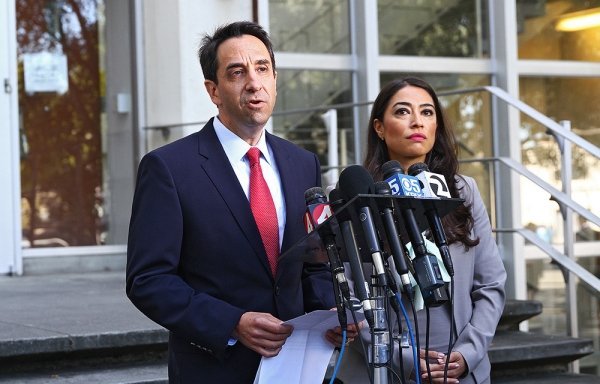New legislation that will establish a mandatory sentence time of three to eight years for anyone convicted of sexually assaulting an unconscious person is now headed to California governor Jerry Brown’s desk.

The bill comes in the wake of a controversy over the six month sentencing of Brock Turner, who was found guilty of assault with the intent to commit rape, sexual penetration with a foreign object of an intoxicated person, and sexual penetration with a foreign object of an unconscious person. Since being proposed in late June by Santa Clara District Attorney Jeff Rosen, the bill, AB-2888, was unanimously passed in the Senate and passed in the State Assembly with a 66-0 vote. This final vote took place five days before Turner’s early release on Sept. 2 after he spent three months in the county jail.

With this new legislation, the consequences for rape and sexual assault of a person who is unconscious or incapable of giving consent due to intoxication will be the same as the consequences for rape and sexual assault of a conscious person. It also states that if a person is convicted of sexually assaulting someone they will not be eligible for probation. The range of the sentence from three to eight years will be up to the decision of the judge who will weigh mitigating factors such as previous criminal history and age.
“The reason that this law is important is it reflects a raising of our consciousness as a society,” Rosen said in a press conference on June 22 when he proposed the bill. “What this law reflects is saying that sexually assaulting an unconscious person is as serious as sexually assaulting a conscious person and there should be no distinction between those because rape is rape.”
California Penal Code Section 261 defines rape as nonconsensual sexual intercourse accomplished by force, threat, or fraud with a person who is not the spouse of the perpetrator.
“For a long time- let’s be honest, for decades- what happened on college campuses on Saturday nights was overwhelmingly swept under the rug,” Rosen said. “I think this legislation that we are proposing is a positive step to recognize the awareness that we have about sexual assault, something that will help to empower sexual-assault victims and survivors, something that will deter criminals and perpetrators, and something that we hope changes people’s views about what to do in situations like this.”
California Assemblymen Evan Low, D-San Jose and Bill Dodd, D-Napa officially introduced the bill. Assembly members Rob Bonta, D-Oakland and Nora Campos, D-San Jose and state Senators Joel Anderson, R-Alpine; Jim Beall, D-San Jose; Jerry Hill, D-San Mateo; and Jeff Stone, R-Temecula coauthored the bill.
“Sexually assaulting an unconscious or intoxicated victim is a terrible crime and our laws need to reflect that,” Dodd said in a statement. “Letting felons convicted of such crimes get off with probation discourages other survivors from coming forward and sends the message that raping incapacitated victims is no big deal…Current law actually incentivizes rapists to get their victims intoxicated before assaulting them.”
The Oracle conducted a poll taken by 212 students at Mountain View High School. When asked if they would support legislation making the consequences of raping an unconscious person the same as raping a conscious person, 60.8 percent supported the new bill, while 11.8 percent did not support it and 27.4 percent of students did not have enough information to support or challenge the legislation.

According to Rosen, the bill was inspired by the impact statement written by the woman that Turner sexually assaulted at the Stanford campus on Jan. 17, 2015. The letter went viral during the March 2016 trial. The woman has been referred to as Jane or Emily Doe to protect her identity and privacy.
“We’ve read her letter. Now let’s give her back something beyond worldwide sympathy and anger. Let’s give her a legacy that will send the next Brock Turner to prison,” Rosen said. “Let’s give the next sexual-assault victim no reason to fear that her attacker will be walking around free after spending less time in jail than a college semester.”
Many MVHS students took to social media sharing the letter and other articles related to the case or expressing their opinions on the it.
“Headlines were talking about how attractive he was, how he was a male with a great bright future…but when the perpetrator is black or latino, the response is much different,” MVHS senior Vandita Pendse said. “Brock Turner was almost never labelled as a rapist unless it was discussed on social media with other liberal social media accounts.”
This is not the only legislation to rise amid the national controversy over the Brock Turner sentencing. On Sept. 6, the House of Representatives unanimously approved the Sexual Assault Survivors’ Bill of Rights with bipartisan support. The bill guarantees survivors access to rape kits, also known as a sexual assault forensic exam, to preserve possible DNA evidence. It gives them the right to know about any test results from the kits and prevents kits from being destroyed within a state’s maximum statute or limitations or they will be notified 60 days before it’s destroyed. It also ensures that survivors will not have to pay for testing.
The bill was introduced by two California representatives Mimi Walters and Zoe Lofgren. It is meant to be a way to standardize the way sexual assault cases are treated nationally.
An almost identical bill was passed unanimously in the Senate in May, so the differences between the two bills will be worked out before the legislation is sent to President Obama for his signature.
When students were asked if they had heard about the Brock Turner sexual assault case, 80.2 percent responded that they had heard of the case and 72.2 percent of students knew at least the basics of the case.
The assault took place after a fraternity party, hosted by Kappa Alpha, that both Turner and Doe had attended at Stanford. Turner was a freshman at the university at the time while Doe was not a student. Doe was fully employed and living with her parents in Palo Alto. She said that she went to the party to spend time with her younger sister.
Before Doe’s mother drove her, her sister, and two friends to the campus at 11 pm, Doe had eaten a full meal and taken four shots of whiskey. Court documents detailed that she later had two shots of vodka and “some beer” at the party. Turner was cited as having seven beers and a “couple swigs” of whiskey.
The assault took place outside behind a dumpster. Turner had removed Doe’s underwear and penetrated her with his fingers without taking his pants off. Two male Swedish students were passing by on bikes when they intervened because they noticed that Doe was motionless with her eyes closed and her head tilted to the side. Meanwhile Turner was on top of her thrusting his pelvis towards her. When they yelled at Turner he looked up and ran away, but the two men tackled him to the ground. Doe was unconscious with her hair disheveled, her necklace wrapped around her neck, her bra pulled out of her dress, and her dress pulled off over her shoulders and above her waist. She was naked all the way down to her boots with her legs spread open. Doe was unconscious for three hours after the paramedics reached her and began giving her treatment.
In Doe’s letter she describes waking up in the hospital with pine needles in her hair and dried blood and bandages on the backs of her hands and elbow. She had multiple tests done to check her vagina and anus for abrasions, yet she didn’t know what had happened to her the night before.
“I learned what happened to me, sitting at my desk reading the news at work. I learned what happened to me the same time everyone else in the world learned what happened to me,” Doe wrote in her letter.
The night after the assault, Turner told police that he never planned to bring Doe back to his dorm room and he didn’t know why they were behind a dumpster. According to him, he was leaving the party because he didn’t feel well when he was chased and attacked. However, one year later at the trial, Turner told a story of Doe’s consent. He said they were dancing at the party and kissing and holding hands when they left before they ended up on the ground kissing. Since Doe’s last memory before waking up in the hospital the next day was being at the party with her sister, Turner’s attorney repeatedly told the 12 jurors that the only one they could believe was Turner.
Based off what Turner was convicted of, he could have faced a minimum of two years in a state prison and a maximum of 14 years.
Monica Lassettre was the probation officer who wrote the sentencing recommendations for this case. She advised Judge Persky to be lenient on the grounds that Turner was drunk.
“This case, when compared to other crimes of similar nature, may be considered less serious due to the defendant’s level of intoxication,” Lassettre wrote.
She also based her recommendation off of Turner’s lack of a prior criminal record and his “sincere remorse and empathy for the victim.”
The deputy district attorney who prosecuted the case, Alaleh Kianerci, looked at Doe’s level of intoxication when she asked the judge for a harsher sentence of six years. She wrote that Doe’s intoxication was an “aggravating factor warranting a prison sentence [for Turner.]”
The prosecution’s sentencing memo found that this instance was not Turner’s only run in with the law. Photos and text messages found on Turner’s phone showed that he was “engaging in excessive drinking and using drugs.” One of those drugs was LSD and he was arrested in November of 2014 for underage alcohol possession. Two women that were interviewed by detectives said that Turner had aggressively flirted with them the weekend before the assault. The women said he was “touchy” and “creeped” them out due to his persistence. Doe’s sister had a similar encounter with Turner at the party and she told police that she had twice repelled kissing and advances by him.
Persky agreed with Lassettre saying that there was “less moral culpability” for a defendant who is intoxicated. He made a legal exception due to Turner’s young age and lack of criminal record. Turner was sentenced to three years of probation, six months in county jail, and lifelong registration as a Tier III sex offender in his home state of Ohio. He will have to re-register four times per year. Turner’s six months was cut to three due to his good behavior.
Persky’s sentencing was controversial and caused a national outrage. Several petitions were made to remove Persky, who The Guardian identified as a Stanford alumnus. One petition had been signed by 1,311,786 supporters as of Sept. 14.

In The Oracle’s survey, 73.6 percent of students disagreed with Persky’s sentencing while 3.3 percent of students agreed with the sentencing and 23.1 percent of students didn’t have enough information to support or challenge Persky’s sentencing. Even though many students disagreed with Persky, only 9% had signed one of the many petitions circling the internet that support Persky’s removal.

“I think there were a plethora of consequences that could’ve been much more applicable to this situation: obviously a longer sentence, obviously not validating [Turner’s] community service project about raising awareness of the party culture,” Pendse said. “I think that restorative justice in combination with a longer sentence…would’ve been a great way to show an example of a Stanford admit, boy with a great future, engaging in restorative justice…because it would show that he’s recognizing his mistakes, he’s apologizing to the victim. I think this is a great opportunity to implement something like this on a national level to show people across the country what the proper response to something like this is.”
After Persky sentenced Turner, Rosen removed the judge from another sexual assault case dealing with a male Kaiser Permanente surgical nurse who was accused of sexually assaulting a sedated woman. This was coming after Persky dismissed a misdemeanor stolen property case in the middle of the trial before the jury deliberated. He ruled in response to a defense motion that the state hadn’t proved its case. It is rare to take actions like this against a judge, according to Rosen, and it only happens four to five times a year. Perksy requested to be reassigned to San Jose where he will not preside over criminal cases. He began presiding over civil cases Sept. 6.
Turner also had to withdraw from Stanford ten days after his arrest and is banned from the campus. In his statement, he blamed the sexual assault on the Stanford “party culture” and describes that he is “consumed by [his] poor judgement and ill thought actions.”
His father, Dan Turner, wrote a statement as well saying that “Brock [was] absolutely devastated by the events.”
This statement became part of the national debate and angered many when he wrote, “That is a steep price to pay for 20 minutes of action out of his 20 plus years of life.”
“Saying that is validating someone’s behavior and saying ‘you know what, that’s ok, it was just a little mistake,” Pendse said regarding Dan Turner’s statement. “This woman is going to have this for the rest of her life: the burden of knowing what happened to her. It’s a life altering event…I think this sets the precedent for more sexual assaults and rape in the future like this.”
Now that Turner is no longer in the county jail, his parents have asked local police to assist them in dealing with the protesters outside of their Sugarcreek Township house in Ohio. They also asked them to keep an eye out for death threats against their son.
“We’re told at a young age not to do [drugs], much younger than we’re told about rape. I’ve never heard a health class say you shouldn’t rape someone…I think the discussion about rape is just completely omitted from the education system. We pretend it doesn’t happen, but teaching young boys and young girls to not violate someone has to happen at a young age,” Pendse said. “We need to be instilling morals that [with rape] you’re going to be harming other people.”



































Concerned Citizen • Sep 20, 2016 at 10:46 pm
http://www.vox.com/2016/9/9/12854930/brock-turner-jacob-wetterling
As a student interested in the legal process and having full faith in Jeff Rosen, I still feel these reactionary, harsh prison sentences are out of line with the ultimate goals of repairing the societal problems surrounding cases of this type. Mandatory minimum sentences and sexual offender cases will ultimately still be disproportionately abused towards people of color, and put more power in the hands of the judges rather than the people.
:/ • Sep 25, 2016 at 4:43 pm
there is a mandatory prison sentence towards MURDER why not rape?? one could argue that murder is JUST as bad. And it’s not as those POC don’t also deserve those harsh sentences if they raped someone, it’s that white people deserve those sentences too (that they unfortunately are not getting at this time) but with a mandatory minimum sentencing they will be getting it. Sexual offenders are people who are a menace to the society and the criminal justice system INSIDE prisons themselves must be restored but they still need to go to prison anyways.